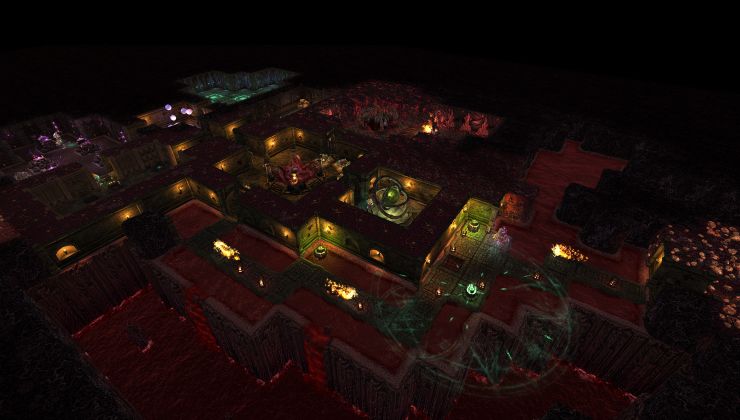Some interesting Linux industry news for you here, as the long road towards Wayland by default everywhere is taking another big step with Red Hat Enterprise Linux (RHEL) removing the Xorg server and other X servers (except Xwayland) from RHEL 10 and the following releases.
From their announcement by developer Carlos Soriano Sanchez posted November 27th:
We want to recognize the significant effort all these organizations and individuals have made, especially the rest of the upstream community, without whom this project would never be so mature. This effort gave us the confidence to first make Wayland default for most use cases in RHEL 8, followed up with the deprecating of Xorg server in RHEL 9, with the intention of its removal in a future release. Earlier this year (2023), as part of our RHEL 10 planning, we made a study to understand Wayland’s status, not only from an infrastructure perspective, but also from an ecosystem perspective. The result of this evaluation is that, while there are still some gaps and applications that need some level of adaptation, we believe the Wayland infrastructure and ecosystem are in good shape, and that we’re on a good path for the identified blockers to be resolved by the time RHEL 10 is out, planned to be released on the first half of 2025.
With this, we’ve decided to remove Xorg server and other X servers (except Xwayland) from RHEL 10 and the following releases. Xwayland should be able to handle most X11 clients that won’t immediately be ported to Wayland, and if needed, our customers will be able to stay on RHEL 9 for its full life cycle while resolving the specifics needed for transitioning to a Wayland ecosystem. It’s important to note that “Xorg Server” and “X11” are not synonymous, X11 is a protocol that will continue to be supported through Xwayland, while the Xorg Server is one of the implementations of the X11 protocol.
Red Hat and their engineers have their fingers in many pies across the Linux space, so this is a pretty big move, and one they say will enable them to "tackle problems such as HDR, increased security, setups with mixed low and high density displays or very high density displays, better GPU/Display hot-plugging, better gestures and scrolling, and so on" — which of course will end up benefiting everyone because that's how open source works.
Have you fully switched over to Wayland yet?
Last edited by TactikalKitty on 28 Nov 2023 at 2:12 pm UTC
Hopefully the wayland folks remember about the gamers when prioritizing the missing features.
But I honestly feel it's too soon for something like RHEL to outright drop Xorg entirely. There could be a whole heap of legacy enterprise applications which don't place nicely with Xwayland.
Luckily however, RHEL10 is a ways off and RHEL9 has quite a bit of life left in it.
Although personally, I am slowly moving my business systems out of the RHEL ecosystem and into the Debian / BSD ecosystem
I was shopping for a new monitor for black Friday and was debating with myself about how useful would HDR and Freesync features be since Wayland can't support those yet and I don't really know when they'll get decent support.If you're on AMD, freesync works just fine under Wayland. It was one of (many) reasons I switched my system over to Wayland.
Hopefully the wayland folks remember about the gamers when prioritizing the missing features.
Last edited by BlackBloodRum on 28 Nov 2023 at 2:20 pm UTC
So I suppose this is just to say that the xorg server will also be available only through EPEL -- since xorg-gnome is pretty much already deprecated, it's entirely reasonable & expected that RHEL should do this.
... which notion, of course, won't quell the 'display server freedom' riots over at phoronix forums. I'm 100% sure there will be several who'll 'read' this announcement as someone 'pushing a button' at Microsoft headquarters to cripple their 'computing life', or whatever.
Last edited by R Daneel Olivaw on 28 Nov 2023 at 2:26 pm UTC
I want to switch over to Wayland but there is a bug in the nVidia 545 driver that is causing my system to freeze after a wake from sleep/hibernate event. This forces me to hard reboot every time. This seems to be a specific issue pertaining to this particular driver version and Wayland as this problem is reproducible on other distributions. The nVidia 535 driver doesn't seem to have this problem. Unfortunately, OpenSuse Tumbleweed doesn't have the previous driver anymore.
What's truly annoying, IMO, is that this bug comes and goes between driver releases.
*Otherwise* nvidia proprietary works fine *even with* wlroots nowadays (my experience is mostly limited to labwc though, which is the wlroots compositor that I'm most interested in); but this one issue is a total 'showstopper'.
I switched over to full-time Wayland when Plasma 5.27 was released for one simple reason: the feature that allows you to push esc on a lock screen and instantly put the monitors to sleep doesn't work on X. It does on Wayland. There are other minor things, but honestly I didn't really notice much of a difference otherwise. I'm on an all-amd system though, so I know it's easier for me compared to nvidia users.Got to be one of my most favourite/used features. It's just so convenient once you get used to it.
Got to be one of my most favourite/used features. It's just so convenient once you get used to it.
It really is! I use it constantly. So much so, that if I ever were to use another de, I'd have to make sure it has that feature or some plugin that'd enable it.
I like Wayland, and generally support it.
But I honestly feel it's too soon for something like RHEL to outright drop Xorg entirely. There could be a whole heap of legacy enterprise applications which don't place nicely with Xwayland.
It's always going to be too soon, but trial by fire is the only way new FOSS APIs ever make it over the finish line. Supporting a protocol no one uses doesn't make a whole lot of sense in terms of time investment, but if it's made the default it heavily incentivizes fixing those problems out of necessity.
So things will be rough for a while. Change is hard.
Last edited by sharkcheese on 28 Nov 2023 at 2:37 pm UTC
So things will be rough for a while. Change is hard.
-- unless the organization that has a RHEL subscription is at liberty to use the EPEL repos (which they might not be); it's not like RHEL is erasing the xorg server from the internet altogether.
I like Wayland, and generally support it.
But I honestly feel it's too soon for something like RHEL to outright drop Xorg entirely. There could be a whole heap of legacy enterprise applications which don't place nicely with Xwayland.
It's always going to be too soon, but trial by fire is the only way new FOSS APIs ever make it over the finish line. Supporting a protocol no one uses doesn't make a whole lot of sense in terms of time investment, but if it's made the default it heavily incentivizes fixing those problems out of necessity.
So things will be rough for a while. Change is hard.
True, and maybe this announcement will see some of the major bottlenecks improve over the next 18 months. But still, the E part in RHEL is not necessarily known for being cutting edge. Especially the graphics/animation industry that heavily relies on nvidia may just choose to stick with RHEL9 for a much longer time than RH wants.
Especially the graphics/animation industry that heavily relies on nvidia may just choose to stick with RHEL9 for a much longer time than RH wants.Not sure who their customers are, but they are apparently in need of things like HDR.
Red Hat recently [redirected a lot of their developers to work on Wayland](https://lwn.net/Articles/933525/). Specifically to "focusing on gaps in Wayland, building out HDR support, building out what’s needed for color-sensitive work, and a host of other refinements required by Workstation users".
Quite a controversial move as they stopped said developers from maintaing a lot of packages and projects. (On company time at least.)
Seems to be a real "all hands on deck" situation with Wayland.
Last edited by whizse on 28 Nov 2023 at 3:11 pm UTC
If we were talking about a general user centric distro, such as Ubuntu or Fedora. Then that'd be just fine, as it would push the majority of users over and help fix issues. No problem for them.I like Wayland, and generally support it.
But I honestly feel it's too soon for something like RHEL to outright drop Xorg entirely. There could be a whole heap of legacy enterprise applications which don't place nicely with Xwayland.
It's always going to be too soon, but trial by fire is the only way new FOSS APIs ever make it over the finish line. Supporting a protocol no one uses doesn't make a whole lot of sense in terms of time investment, but if it's made the default it heavily incentivizes fixing those problems out of necessity.
So things will be rough for a while. Change is hard.
When talking about enterprise users however, they do not like to be pushed into anything experimental. And what they use must stay rock solid.
The two user bases are distinctively different, and use their software very differently. Remember that for business purposes, if you replace a service or software, then what you replace it with must be as good, or better. Never a downgrade. An enterprise may argue or feel that the experimental Wayland, that may not work with their nvidia hardware fully, is a downgrade.
That's bad.
There's no guarantee that EPEL will carry Xorg though. You're guessing that they would, no one has confirmed that will happen. In addition some enterprises may have policies which prevent unsupported community repos like EPEL being used.So things will be rough for a while. Change is hard.
-- unless the organization that has a RHEL subscription is at liberty to use the EPEL repos (which they might not be); it's not like RHEL is erasing the xorg server from the internet altogether.
I think it's just too soon for something aimed purely at enterprise/business usage to be dropping something that many of them rely on, particularly when the replacement is not entirely ready yet.
If this was a regular distro, then it would be reasonably acceptable to say that it's time for users to move on to push the technology. It can be fixed easily for them. But we're talking about RHEL and enterprise here. They may get stuck with a buggy Wayland version for many years to come.
What RHEL is really saying is it's mature enough for them and their use case, and like everything RedHat does, they state things like they represent linux as a whole and can be pretty heavy handed about it.
That said, they do hold a lot of sway, and this will likely put even more pressure on others to follow suit. Let's just hope others do so in a good, positive, way.
Two major outliers were Firefox and Wine. Firefox now works with Wayland well and Wine is progressing to enable Wayland driver.
Last edited by Shmerl on 28 Nov 2023 at 3:57 pm UTC
Never had that issue with X11, so I keep using that.
Last edited by williamjcm on 28 Nov 2023 at 3:58 pm UTC












 How to set, change and reset your SteamOS / Steam Deck desktop sudo password
How to set, change and reset your SteamOS / Steam Deck desktop sudo password How to set up Decky Loader on Steam Deck / SteamOS for easy plugins
How to set up Decky Loader on Steam Deck / SteamOS for easy plugins
See more from me